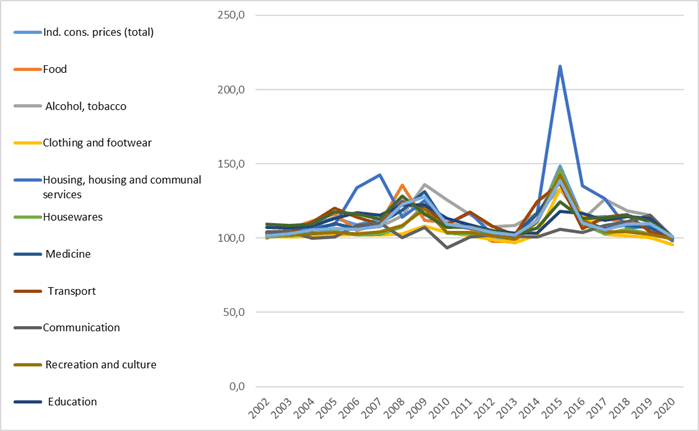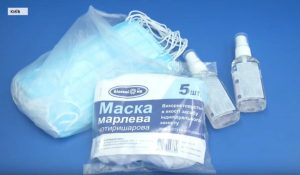Dynamics of the consumer price index in 2002-2020, in %

The Cabinet of Ministers of Ukraine at a meeting on Wednesday extended the decree that exempts the list of goods necessary to prevent coronavirus (COVID-19) from duties.
According to the text of the relevant decree, released on the government portal, the new document also envisages the inclusion of test systems for the qualitative detection of antibodies and an automatic station for the extraction of ribonucleic acid in the list of goods to prevent COVID-19 disease.

Mobalytics, a startup with Ukrainian roots, has announced the closure of the series A funding round in the amount of $11.25 million, investments will be used for the creation of a personal assistant for gamers.
Mobalytics told Interfax-Ukraine that the round was headed by the venture funds Almaz Capital and Cabra VC. Other investors who participated in the round include HP Tech Ventures, General Catalyst, GGV Capital, RRE Ventures, Axiomatic, and T1 Esports.
“Being among the first investors, Almaz Capital supported Mobalytics at every stage of the startup’s growth from the launch of the first game to the emergence of several game genres on the platform. The team did this masterly, creating all the conditions for scaling their product,” Danylo Stoliarov, a partner of Almaz Capital, said.
The startup plans to use the attracted investments to further develop the product, improving analytics and a personalized approach to each user. In addition, Mobalytics intends to increase the number of supported games on the platform and expand its technical and product teams over the next six months.
The Mobalytics team has been building and testing the GPI (Gamer Performance Index) for four years.
Mobalytics is an analytics platform and personal gaming assistant designed to help video game fans hone their skills. In 2016, the startup won the TechCrunch Disrupt Battlegrounds.
One of the largest parts of the startup team is located in Ukraine, the head office is located in Los Angeles (the United States), two of the three project founders are also Ukrainians.

President of Ukraine Volodymyr Zelensky has signed a decree establishing a visa-free regime for citizens of Australia, New Zealand and the countries of the Arabian Peninsula. Corresponding decree No. 289/2020, dated July 21, was published on the website of the head of the Ukrainian state. It comes into force on the day of its publication.
“To establish, from August 1, 2020, a visa-free regime of entry into Ukraine and transit through the territory of Ukraine for citizens of Australia, New Zealand, the Kingdom of Bahrain, the State of Kuwait, the Sultanate of Oman, the Kingdom of Saudi Arabia, if their stay in Ukraine does not exceed 90 days during 180 days. The Cabinet of Ministers of Ukraine is to take the measures expiring from this decree,” the text of the document reads.

The Affordable Loans 5-7-9% program will show results in the coming month as small and medium-sized businesses need such loans following the recent lockdown restrictions, Prime Minister of Ukraine Dents Shmyhal has said. “I am sure this program [Affordable Loans 5-7-9%] will show results literally in the coming month and this more than UAH 30 billion is exactly the borrowing base which could be refinanced this year,” he told reporters.
The prime minister also said that the government is ready to continue implementation of this program next year as well.

The Ukrainians are ambivalent about the possibility of granting autonomy within Ukraine to the temporarily occupied territories of Donetsk and Luhansk regions for the purpose of ending hostilities and peaceful conflict settlement in Donbas.
During a nationwide poll by the Social Monitoring Center on July 8-15, 42.7% said they “would support” or were “likely to support” such an autonomy for Donbas, according to the poll’s findings unveiled at an Interfax-Ukraine press conference in Kyiv on Tuesday .
At the same time, 39% would rather “not support” or were “certain not to support” a Donbas autonomy.
On the regional level, the autonomy is seen as a solution by 64.2% in Donbas, 59.2% in the south, 57.3% in the east and 41.6% in the Central Region, and by only 15.7% in the west of Ukraine.
Most in the Western Region (66.9%) said they would “rather not support” or were “certain not to support” a decision to grant Donbas an autonomy. The figures for central, eastern, southern and Donbas regions were 38.2%, 27.2%, 21.9% and 17.5%, respectively. A total of 18.3% were undecided.
Asked whether direct talks with Russia are necessary to attain a peace, 38% said yes, absolutely, 31.6% were inclined to agree and 8.7% were inclined to disagree, and 12.1% said absolutely not. Most of those who said such talks were necessary for peace in the east and Donbas were 50.2% and 46.5%, respectively; in the latter group, 20.7% were respondents in western Ukraine.
The poll entitled “Opinions and views of the Ukrainian population, July 2020,” surveyed 3,035 respondents; margin of error: 1.1-1.9%.